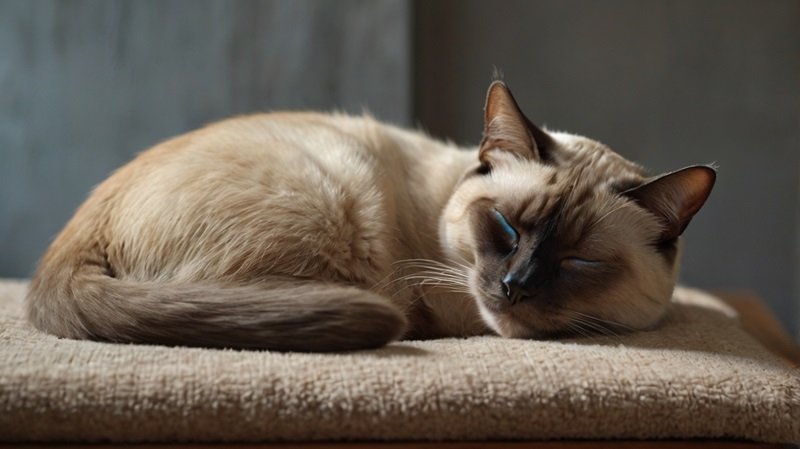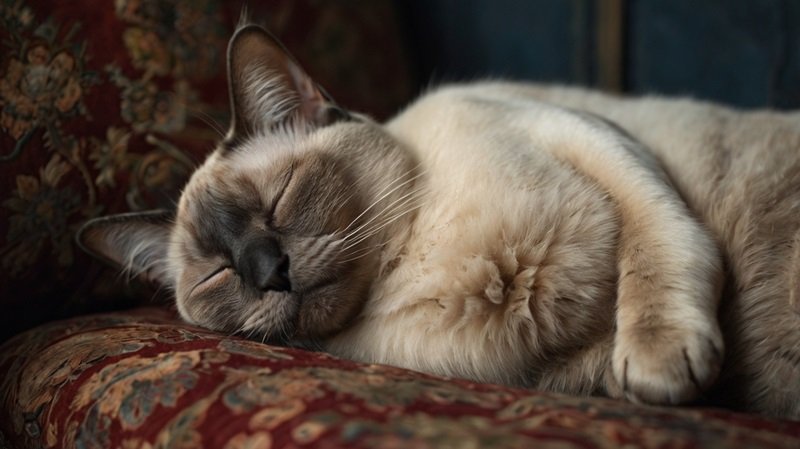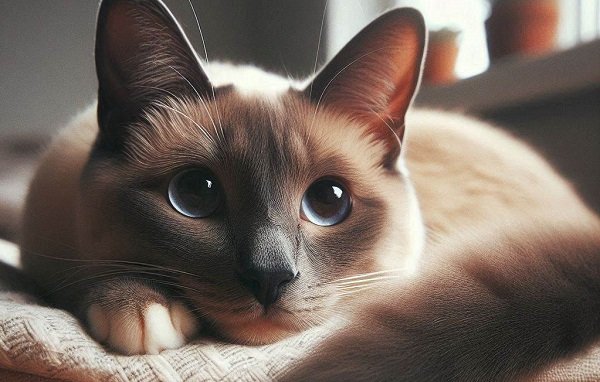With their distinctive color points and charismatic personalities, Siamese cats undergo significant changes as they age. Your Siamese companion will experience various transformations throughout their senior years, typically beginning around age 10. As an owner, you’ll notice alterations in their coat color, which often becomes darker and may develop a subtle reddish tint. While Siamese cats generally enjoy impressive lifespans of 15-20 years, they can face age-related challenges like reduced mobility and vision changes. By understanding these natural progressions, you can adapt your care routine to ensure your feline friend’s comfort and well-being during their golden years.
Key Takeaways:
- Siamese cats are long-lived companions, with lifespans typically ranging from 12-20 years, making them one of the most enduring domestic cat breeds
- As they age, Siamese cats experience notable physical changes including darker coat coloring, potential muscle loss, and their signature blue eyes may develop cloudiness
- Senior Siamese cats commonly face health challenges such as kidney disease, hyperthyroidism, and arthritis, requiring regular veterinary monitoring
- Their distinctive vocal nature may intensify with age, often indicating underlying health issues or cognitive changes that need attention
- Adapting their environment with heated beds, accessible litter boxes, and maintaining routine vet check-ups helps ensure comfort in their senior years
How old can my Siamese Cat live
While you might expect an average cat lifespan, your Siamese companion can actually be your friend for much longer. These elegant felines typically live 12 to 20 years, making them one of the longest-living cat breeds. With your dedicated care and attention, your Siamese can even reach their early twenties, though this is less common. You’ll find that these cats generally maintain good health well into their senior years, though you should watch for typical age-related issues. Your indoor Siamese will likely live longer than an outdoor cat, and providing proper nutrition and regular vet check-ups can significantly extend their lifespan.
Physical Changes in Aging Siamese Cats
To recognize aging in your Siamese cat, watch for gradual changes in their appearance and mobility. As your cat enters their senior years (typically around age 10), you’ll notice alterations in their coat texture, muscle definition, and overall body condition. While some changes are natural parts of aging, sudden dramatic changes could signal health issues requiring immediate veterinary attention.
Coat and Color Changes
About your Siamese cat’s distinctive appearance, you’ll notice their coat becoming increasingly darker as they age, particularly in their point areas. This darkening occurs due to changes in their body temperature regulation system. You might also observe their once-sleek fur becoming coarser and less lustrous. Regular grooming can help maintain coat health and allow you to detect any unusual skin conditions early.
Weight and Muscle Loss
For your aging Siamese, maintaining healthy body weight becomes challenging. You’ll likely notice gradual muscle loss, particularly around their spine and hindquarters. This condition, known as sarcopenia, affects up to 50% of senior cats, but proper nutrition and gentle exercise can help slow this process.
The management of your senior Siamese’s weight requires careful monitoring. Sudden weight loss can indicate serious health issues like hyperthyroidism or kidney disease, while weight gain might result from reduced activity. You should aim to maintain their weight through a balanced diet specifically formulated for senior cats, containing high-quality protein to support muscle mass.
Common Health Issues in Senior Siamese Cats
One of the most significant challenges you’ll face with your aging Siamese cat is managing their health conditions. As your cat enters their senior years (typically around age 10), they become more susceptible to various health issues that require early detection and proper management. Understanding these conditions will help you provide better care and potentially extend your cat’s lifespan.
Kidney Disease
The most common serious condition affecting senior Siamese cats is kidney disease, affecting up to 30% of older cats. You might notice your cat drinking and urinating more frequently, losing weight, or showing decreased appetite. Early detection through regular vet check-ups can significantly improve your cat’s prognosis, allowing for proper dietary adjustments and medication when needed.
Hyperthyroidism
Below age 10, your Siamese cat may develop hyperthyroidism, a condition where the thyroid gland produces excess hormones. You’ll notice your cat eating more but paradoxically losing weight. This condition is highly treatable when caught early, with success rates above 95% using radioactive iodine therapy.
And while hyperthyroidism can be concerning, you have several treatment options available. Your cat might benefit from daily medication, radioactive iodine therapy, or dietary changes. The condition can be life-threatening if left untreated, but with proper management, your Siamese can maintain a good quality of life for many years after diagnosis.
Behavioral Changes in Aging Siamese Cats
All aging Siamese cats experience behavioral shifts that you might notice as your pet enters their senior years. These changes can include increased vocalization, altered sleep patterns, and reduced activity levels. While some modifications are normal parts of aging, others may signal underlying health issues that require your attention. You’ll need to monitor these changes closely, as your Siamese cat relies on you to interpret their changing needs.
Increased Vocalization
The natural chattiness of Siamese cats often intensifies with age, particularly during nighttime hours. You may notice your senior cat becoming more vocal due to disorientation, anxiety, or physical discomfort. This behavior can be managed through maintaining consistent routines and ensuring regular veterinary check-ups to rule out medical conditions that might be causing distress.
Reduced Activity
Among the most noticeable changes you’ll observe in your aging Siamese is a decrease in physical activity. Your once-energetic companion may now spend up to 20 hours a day sleeping, showing less interest in play and exploration. This natural slowdown helps conserve energy and protect aging joints.

Considering your senior Siamese’s reduced activity levels, you’ll need to make appropriate adjustments to their environment. Installing ramps or steps to favorite perches can help them maintain independence, while shorter but more frequent play sessions can keep them mentally and physically engaged without overtaxing their energy reserves.
How to Care for an Aging Siamese Cat
Unlike younger cats, senior Siamese require specialized attention as they enter their golden years. Your aging companion needs adjustments in their daily routine, including easier access to resources, comfortable resting spots, and regular health monitoring. You’ll need to modify their environment by providing low-sided litter boxes, non-slip surfaces, and warm, soft bedding to accommodate their changing physical abilities.
Diet & Nutrition
By maintaining a proper diet, you can significantly impact your senior Siamese’s health. You should feed them high-quality senior cat food rich in protein and adjust portions to prevent obesity. Your cat may benefit from wet food options, which provide imperative hydration and are easier to digest. Consider supplements for joint health after consulting with your veterinarian.
Veterinary Care
With age-related health concerns becoming more common, you should schedule veterinary check-ups every six months. Your Siamese needs regular monitoring for common senior cat conditions like kidney disease, hyperthyroidism, and arthritis. Early detection of health issues can lead to more effective treatment outcomes.
A comprehensive veterinary care plan should include regular blood work, dental examinations, and weight monitoring. You should discuss any behavioral changes with your vet, as these could indicate underlying health issues. Preventive care becomes increasingly important as your Siamese approaches their senior years, typically around age 10.
Home Adjustments for Senior Siamese Cats
Now that your Siamese cat is entering their senior years, you’ll need to modify your home to accommodate their changing needs. Making your living space senior-friendly can prevent accidents and injuries that commonly occur in cats over 12 years old. You should install ramps or steps to their favorite elevated spots, and place non-slip mats on slippery surfaces to help them maintain balance. Consider setting up multiple easily accessible feeding stations and litter boxes on each floor of your home, as older cats may struggle with stairs. Adding soft, heated beds in quiet corners will help soothe their aging joints, while maintaining stable room temperatures ensures your senior Siamese’s comfort throughout the day.
Final Thoughts
Not all Siamese cats age the same way, but you can make a significant difference in your companion’s senior years. With regular veterinary check-ups every six months, you’ll catch potential health issues early, while maintaining a proper diet can extend their lifespan up to 20 years. Though aging brings challenges like reduced activity and possible cognitive decline, your Siamese can still thrive with proper care. Creating a comfortable environment with heated beds and easy-access resources will help your beloved pet navigate their golden years gracefully. Your attention to their changing needs will ensure they remain the charismatic, loving companions they’ve always been.
FAQ
At what age is my Siamese cat considered a senior, and what changes should I expect?
Siamese cats typically enter their senior years around 10-12 years old. You’ll notice gradual changes including darker coat coloring, reduced activity levels, possible weight changes, and their signature blue eyes may become slightly cloudy. Regular vet check-ups become especially important during this phase to monitor these age-related changes.
How can I help my aging Siamese cat maintain a healthy weight?
Monitor your senior Siamese’s food intake and adjust portions accordingly. Feed them high-quality senior cat food rich in protein, divide meals into smaller portions throughout the day, and encourage gentle exercise through interactive play. Regular weigh-ins and vet consultations will help maintain optimal weight as metabolism changes occur.
What are common health issues that affect senior Siamese cats?
Senior Siamese cats commonly experience kidney disease, thyroid problems, arthritis, and dental issues. Watch for symptoms like increased thirst, weight changes, difficulty jumping, and changes in eating habits. Early detection through regular veterinary screenings helps manage these conditions effectively.
How can I modify my home to accommodate my aging Siamese cat?
Create a senior-friendly environment by providing easy access to necessities. Install ramps or steps to favorite perches, place multiple litter boxes with low sides throughout your home, use non-slip mats on slippery surfaces, and set up comfortable resting spots with orthopedic beds in quiet areas.
What behavioral changes might I notice in my senior Siamese cat?
Aging Siamese cats may become more vocal, especially at night, show changes in sleep patterns, or exhibit increased neediness or withdrawal. Some may experience confusion or forgetfulness. Maintain consistent daily routines and provide extra attention when sought to help them feel secure during these changes.


